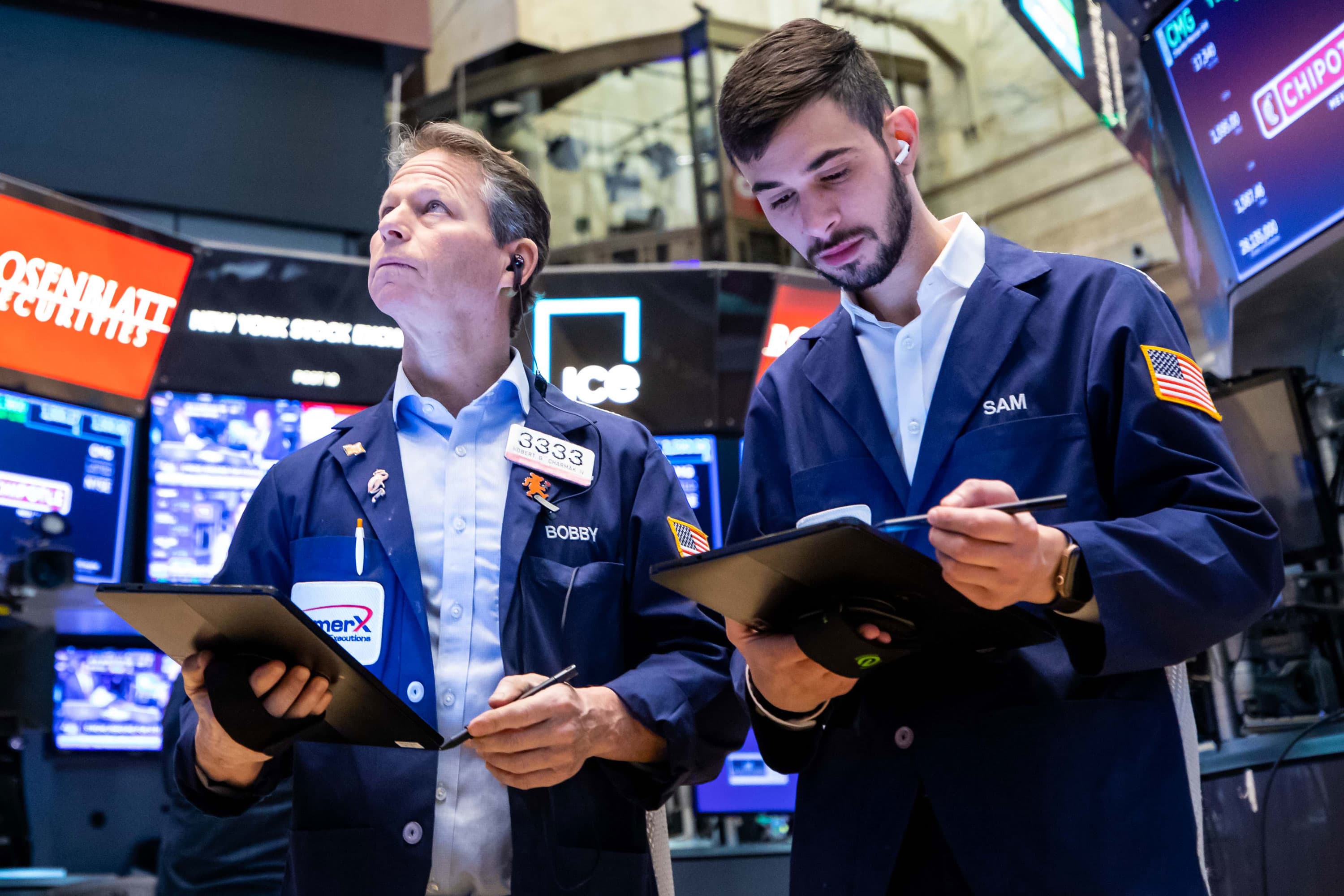Dow falls more than 100 points, tech stocks slide as investors monitor Ukraine-Russia conflict

U.S. stocks fell on Thursday as rapid moves in the energy and bond markets slowed and investors monitored the war in Ukraine.
The Dow Jones Industrial Average dipped 133 points, or 0.4%. The S&P 500 shed 0.5%, while the Nasdaq Composite dropped 1%.
Software was a weak spot in morning trading, with Okta and Snowflake tumbling after their quarterly reports. Tesla dropped 2.6%, while Amazon lost more than 1%.
Some more defensive names supported the Dow, with health care stocks like Amgen outperforming. Transport stocks were also a strength, with Union Pacific rising more than 3%.
Energy prices moved higher overnight but eased on Thursday morning, with futures for U.S. benchmark West Texas Intermediate crude trading near $111 per barrel. The yield on the benchmark U.S. 10-year Treasury nudged higher Thursday to about 1.87%, after having its biggest one-day jump since 2020 during the previous session.
The moves come after a volatile start to the week, with markets seeing sharp reversals in some areas day to day. Stocks, and the tech sector in particular, have been in a downtrend in recent months.
Some on Wall Street are arguing that the market is close to or has already found its bottom for the year. On Thursday, strategists at Citi upgraded their view on U.S. stocks and the global IT sector.
“Despite the difficult events in Ukraine, global equities have been fairly robust. Losses have been concentrated in stocks with direct Russia exposure and Financials. We still want to buy the dips, and highlight that global equities have ended 10-20% higher after previous geopolitical crises,” Citi strategist Robert Buckland said in a note to clients.
Others, however, warn that it could be a bumpy year ahead as the market navigates expected rate hikes and policy tightening from the Federal Reserve.
“Markets have been resilient. How long will that last? It’s getting weaker and it’s getting weaker because the Fed is not injecting liquidity starting from this month,” Allianz chief economic advisor Mohamed El-Erian sadi on “Squawk Box.” “So I expect the strong technicals that have seen us through one shock after the other will get a lot weaker this year, and that means more volatile markets and that also means there’s going to be more pressure on markets.”
On the earnings front Thursday, shares of Best Buy rose more than 4% after the retailer met earnings expectations and hiked its dividend, and Kroger climbed 7.7% after beating estimates on the top and bottom lines.
However, BJ’s Wholesale and Burlington Stores were down sharply in early trading after their earnings reports.
Markets continued to watch the situation in Ukraine, where fighting entered its second week. Ukrainians maintained the capital city of Kyiv, while heavy shelling hit Maripol and Kharkiv. Russian and Ukrainian officials were holding another round of negotiations in Belarus.
“The situation is very fluid on the ground in Ukraine. …We don’t know where the ultimate bottom in the market may be, but we continue to believe the U.S. economy will have above-average growth this year,” said Scott Wren, senior global market strategist at Wells Fargo Investment Institute.
Markets have been volatile in recent sessions as investors assess risks to the U.S. economy fueled by Russia’s war in Ukraine.
Federal Reserve Chairman Jerome Powell will speak to the Senate Banking Committee for his second day of Congressional testimony this week. On Wednesday, the central bank chief seemed to tamp down talk of a half-point interest rate hike at its meeting in two weeks, though he left the door open for more aggressive action.
“We’re going to avoid adding uncertainty to what is already an extraordinarily challenging and uncertain moment,” Powell said Wednesday under questioning from House Financial Services Committee members.
“To the extent that inflation comes in higher or is more persistently high than that, we would be prepared to move more aggressively by raising the federal funds rate by more than 25 basis points at a meeting or meetings,” he added.
In the wake of Powell’s testimony, traders took the possibility of a 50 basis point hike at this month’s meeting completely off the table, though they are still pricing the equivalent of six 25 basis point moves by the end of the year, according to the CME Group’s FedWatch tracker.
On the economic front, jobless claims for last week came in at 215,000. That was lower than the 225,000 expected by economists, according to Dow Jones. The reading comes ahead of February’s highly-anticipated jobs report, which will be released Friday.




